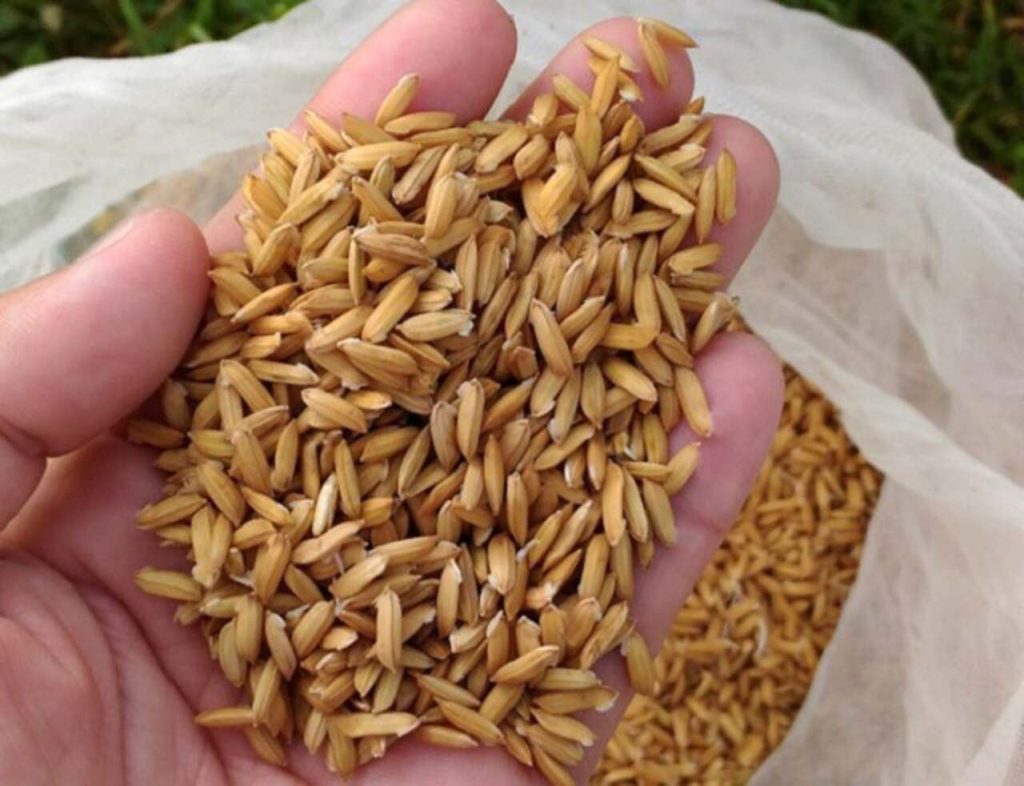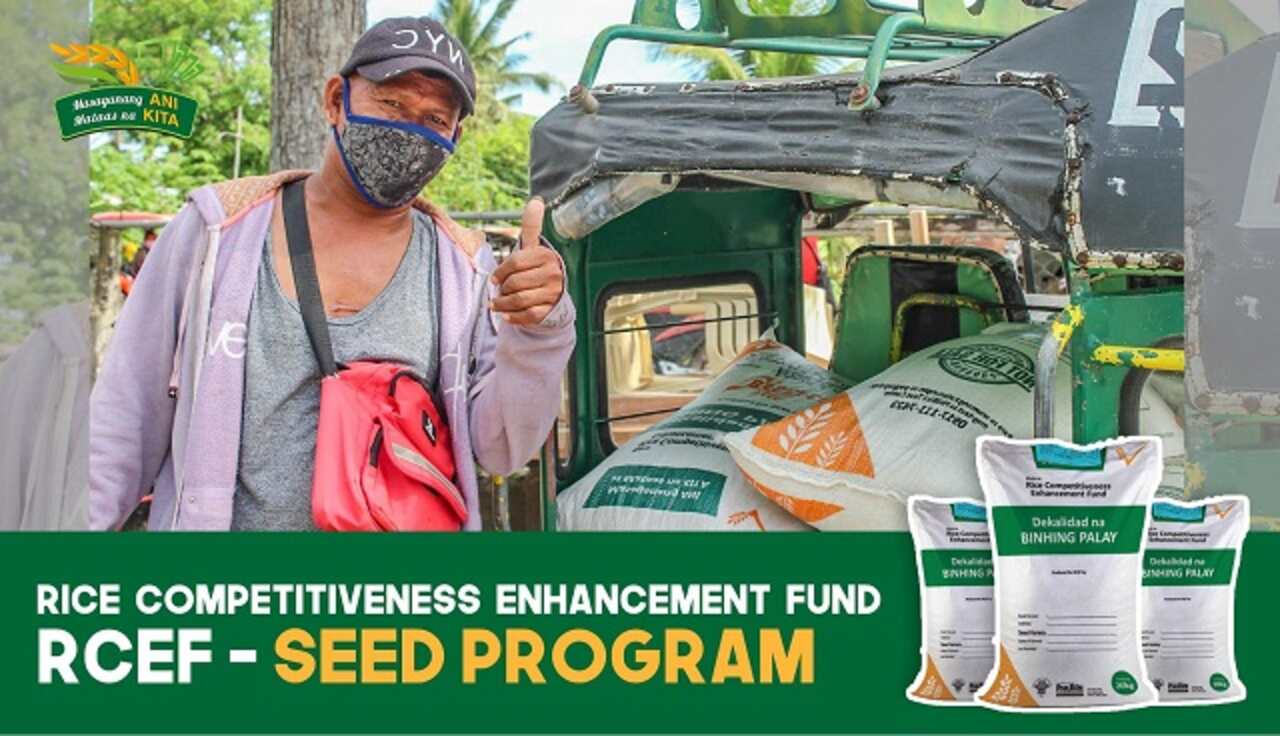The Rice Competitiveness Enhancement Fund (RCEF) Seed Program is a government initiative designed to provide free certified rice seeds to farmers, helping them increase yields and reduce costs. It was established in 2019, under the Republic Act No. 11203, also known as the Rice Tariffication Law, to make the local rice industry stronger, more competitive, and more sustainable amidst global trade liberalization. Funded through tariffs collected from imported rice, the program allocates P10 billion annually, with P3 billion specifically earmarked for the distribution of high-quality certified inbred seeds to eligible rice farmers across the country. The program is spearheaded by the Department of Agriculture (DA) and implemented through the Philippine Rice Research Institute (PhilRice), in collaboration with local government units (LGUs), agricultural technicians, and farmers’ cooperatives.
The main goals of the RCEF Seed Program are to improve rice yield, lower production costs, increase farmers’ income, and ultimately make the country’s rice sector more competitive and resilient. By giving farmers access to free, high-quality seeds, the program helps ensure better harvests and sustainable rice production. In addition to seed distribution, it also provides technical support, training, and capacity-building to empower farmers with the right knowledge and practices, effectively addressing problems on food security while also supporting rural development and poverty reduction in farming communities.
Program Overview

The RCEF-Seed Program is one of the four major components of the RCEF. Under the program, farmers get free certified inbred rice seeds and crop management support, allowing them access to better harvests, technical support, and capacity-building at no extra cost.
The other RCEF components include:
- Inbred rice seed development and distribution
- Farm mechanization
- Expanded credit through LandBank and DBP
- Rice extension and training services
The goal of the RCEF-Seed Program is to increase the use of certified inbred rice seeds in key rice-producing provinces. These high-quality seeds can boost productivity, reduce costs, and promote sustainability when used alongside proper integrated crop management (ICM). The program also targets the following outcomes:
- Yield increase up to 6 tons per hectare in high-yielding provinces
- Cost reduction in rice production by 30%
- Decreased postharvest losses to 12%
- Improved marketing with a cost reduction of ₱1/kg
How the Program Supports Farmers
The RCEF-Seed Program works to:
- Support local seed growers by sourcing seeds from accredited cooperatives
- Encourage farmers’ groups to become organized and eventually become seed producers
- Connect cooperatives with government assistance programs like mechanization, training, credit via LandBank or DBP, and more
- Promote climate-resilient, cost-efficient, and sustainable farming practices
Program Strategies
To make the program sustainable and impactful, the DA and PhilRice apply the following strategies:
1. Strengthening Local Seed Production
- Seeds are sourced from accredited local growers and cooperatives
- Aims to build a self-sustaining national seed supply network
2. Cluster Farming
- Encourages farmers to organize into clusters for better coordination and shared resources
- Promotes synchronized planting and harvest schedules for better productivity
3. Support for Farmer Organizations
- FOs are given access to additional training and certification programs
- May eventually become certified seed producers to support future seed demands
4. Integrated Support Services
- Farmers and FOs may be linked to:
- Financial assistance from LandBank and DBP
- Mechanization tools through PHilMech
- Skills training via TESDA and ATI
Who Can Apply?
The program is open to individual rice farmers and farmers’ organizations (FOs) who meet the eligibility criteria.
For Individual Farmers
- Must be listed in the DA-updated Registry System for Basic Sectors in Agriculture (RSBSA)
- Should be a member of a DA-accredited farmer organization
- Must be cultivating rice fields located in eligible municipalities
For Farmers’ Organizations (FOs)
- Must be accredited by the DA or another recognized government agency
- Should have members whose combined farm area covers at least 20 hectares, located in one to two adjacent villages within a selected municipality or city
How to Apply for the RCEF-Seed Program
Follow these steps to avail of free certified inbred rice seeds under the RCEF-Seed Program:
Step 1: Visit the Registration Booth
- Bring a valid ID with a photo
- Check if your name is on the RCEF masterlist
- If you are listed, proceed to the next step
Step 2: Choose Seed Variety
- Line up according to your preferred rice variety
- Fill out the acknowledgment form and write your name on the provided tag
Step 3: Attend the Technical Briefing
- Participate in the scheduled briefing on seed use and crop management
Step 4: Claim Your Seeds
- Present your name tag
- Receive your seed allocation
- Take a photo holding the seed bag and tags
- Complete the customer satisfaction form at the back and return your name tag
Seed Allocation Per Farmer
Farmers receive free seeds for two consecutive planting seasons starting from the 2020 dry season, based on farm size:
- Farm size: ≤ 0.5 hectare
- Allocation: 1 bag of seeds (20kg/bag)
- Farm size: 0.6 – 1 hectare
- Allocation: 2 bags of seeds (20kg/bag)
- Farm size: 1.1 – 1.5 hectares
- Allocation: 3 bags of seeds (20kg/bag)
- Farm size: > 1.5 hectares
- Allocation: 4 bags of seeds (20kg/bag)
Farmers who reach the target yield in their area may become eligible for seeds again in future cycles.
Target Yields for Repeat Eligibility
To be re-qualified for the program in succeeding seasons, farmers must meet the target yield thresholds:
Irrigated Areas
- Baseline: Below 4 tons/ha
- Target: At least 4 to 6 tons/ha (depending on the season)
Rainfed Areas
- Baseline: 3.5 to 4 tons/ha
- Target: At least 4 to 4.5 tons/ha
Note: Farmer cooperatives that meet program benchmarks—such as higher yield, synchronized planting, and good management—may be prioritized in future distributions and rewarded through existing DA recognition systems.
Seed Variety Selection
The seed varieties available for distribution include:
- Three nationally recommended varieties
- Two region-specific varieties
Distribution is on a first-come, first-served basis, so early registration is encouraged.
Institutional Support
The program is backed by several government institutions:
- PhilRice: Oversees seed development and implementation
- PHilMech: Provides mechanization support
- ATI: Leads technical training
- TESDA: Delivers skills education via farm schools
The program is also aligned with the National Rice Program, which provides broader support for rice production, including irrigation, fertilizer, and crop diversification.
Integration with Other Agricultural Assistance Programs
The Seed Program is not a standalone effort. It is connected to a larger web of support through the National Rice Program, including:
- Fertilizer support
- Farm equipment and mechanization
- Post-harvest facilities
- Credit and financial support
- Research and development
- Irrigation and water efficiency
- Policy and regulatory assistance
Monitoring and Evaluation
The RCEF-Seed Program uses modern tools like remote sensing technology (e.g., PRISM) to monitor outcomes and evaluate the performance of farmer groups. High-performing FOs may qualify for additional support and recognition under DA’s Rice Achievers Award.
Video: Understanding RCEF Seed Program
The Rice Competitiveness Enhancement Fund Seed Program offers an opportunity for Filipino rice farmers to improve yields, reduce costs, and sustain productivity with quality seeds and organized farm support. If you’re a rice farmer listed in the RSBSA or part of a DA-accredited cooperative, this program can help strengthen your rice farming practices with the backing of government resources. Learn more about it by watching this video below:
Visit your local DA-RFO or PhilRice office to inquire about registration schedules in your area. For more information on the program implementation, contact the nearest PhilRice station or your local DA Regional Field Office. You may also check updates from DA-accredited farmer groups or local barangay agricultural offices.
